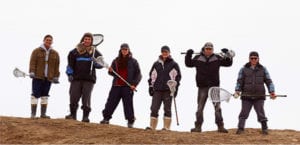Home »

Learning the lessons of life from a lacrosse stick
 “Perceptions,” by Gerry Warner
“Perceptions,” by Gerry Warner
Op-Ed Commentary
If you missed ‘The Grizzlies,’ despite the two sold-out performances in the Key City Theatre last week, don’t fret. I’m sure it will be back. It’s disturbing but tells a story that doesn’t get told often enough and is hard even for Hollywood to ruin.
Hollywood, actually, had nothing to do with it. The harrowing, yet inspiring movie was directed by Canadian director Miranda de Pencier, an actress herself, who based the gritty film on the true experiences of Cranbrook lawyer Russ Sheppard, who early in his career before he took up law, worked as a rookie teacher in a bleak Inuit community in the high Arctic where being high on alcohol was a way of life as suicide was for its numerous tragic youth.
Early in the graphic film, Sheppard asks one of his slouching students how long he’d lived in the tundra village. “Six thousand years.” But after 200 years of colonization and the divisive forces of modernity a once self-sufficient and proud people were reduced to welfare and dependency with drugs and alcohol the only solace for the small village with the highest suicide rate in North America.

After failing miserably at teaching the values of the culture that destroyed them, Sheppard was desperate to get through to the kids that were literally dying before his eyes. What about lacrosse, an activity that would get the kids out of the classroom they hated and teach them teamwork, cooperation and working towards a goal? And lacrosse was a sport invented by aboriginals and Canada’s National Game even if many Canadians don’t realize it.
But the dazed and bitter students weren’t interested. At this point, Sheppard turned to Miranda, one of the few students who showed a flicker of interest in his efforts. She told him to talk to one of his charges who wasn’t even in school because he was out hunting, about the only vestige of traditional Inuit culture left. If you could get him interested in lacrosse, the others would follow because hunting was still respected in Inuit culture, Miranda told him.
At this point, the story becomes predictable and I don’t need to tell you the rest. But the stratagems Sheppard uses to get what eventually became a youth lacrosse league north of the Arctic Circle were creative, entertaining and left a legacy of hope that exists to this day. But here’s a true story that I will tell you from my own early teaching career.
At the tender age of 21, part-way through teacher training, I got a job teaching 36 – that’s right – 36 Grade 6 students in a tough Kootenay mining town that will remain unnamed. I took over just after Christmas because the previous teacher had been driven into early retirement by a rowdy class she couldn’t handle. And neither could I at first. The problem was the boys and one boy in particular, who had fallen out of a tree a couple of years earlier and suffered brain damage. Not a lot of brain damage, but enough that he suffered a learning impairment in an era where there was little, or no special support provided for teachers dealing with students like this. I certainly didn’t get any.
What to do? It drove me crazy for a while. Then one day, I noticed the boys arm wrestling during lunch period in the classroom. My nemesis, of course, was the champ. So, I did something you’d never do in a classroom today. I joined them. One-by-one, I arm wrestled them leading up to my nemesis. He was a pretty strong kid for his age – he was older than the other students – but I managed to beat him while showing great respect for his youthful strength.
Well, that did it! In no time, his behaviour improved dramatically. He handed in his first essay and eventually became a teacher’s pet. The behaviour of the entire class improved accordingly. And so did their learning. By the time June rolled around, I was teaching a class of young scholars engaged with learning. They were happy to be in school. The principal was happy to have them. And their parents were happy with their children and me.
So, what’s the takeaway here? It’s the same as with Russ Sheppard. You’ve got to deal with people at their level. Don’t impose your values on them. Be empathetic. Be honest. Be firm but also be kind and respectful. And if you are, you’ll reap endless rewards. It works on the lacrosse field and it works in life.
Lead image: Young Gerry Warner, back right, with his 1970 Grade 6 class. Photo submitted
– Gerry Warner is a retired journalist and has never touched a lacrosse stick







